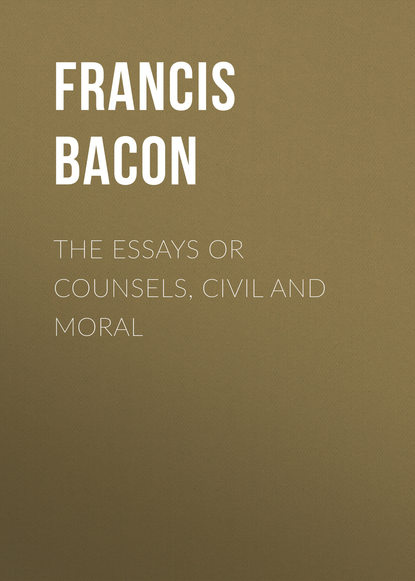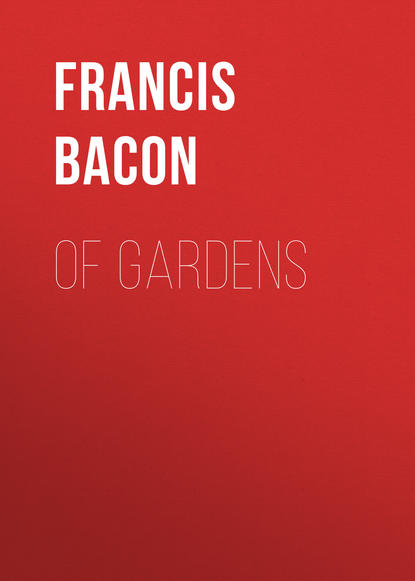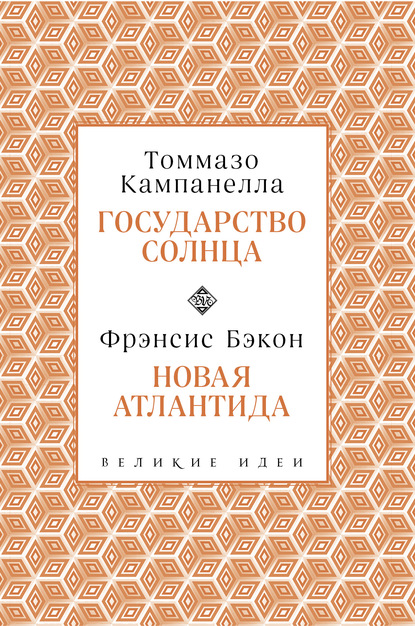 Полная версия
Полная версияПолная версия:
Фрэнсис Бэкон Novum Organum
- + Увеличить шрифт
- - Уменьшить шрифт

Novum Organum Or True Suggestions for the Interpretation of Nature
PREFACE
They who have presumed to dogmatize on nature, as on some well investigated subject, either from self-conceit or arrogance, and in the professorial style, have inflicted the greatest injury on philosophy and learning. For they have tended to stifle and interrupt inquiry exactly in proportion as they have prevailed in bringing others to their opinion: and their own activity has not counterbalanced the mischief they have occasioned by corrupting and destroying that of others. They again who have entered upon a contrary course, and asserted that nothing whatever can be known, whether they have fallen into this opinion from their hatred of the ancient sophists, or from the hesitation of their minds, or from an exuberance of learning, have certainly adduced reasons for it which are by no means contemptible. They have not, however, derived their opinion from true sources, and, hurried on by their zeal and some affectation, have certainly exceeded due moderation. But the more ancient Greeks (whose writings have perished), held a more prudent mean, between the arrogance of dogmatism, and the despair of scepticism; and though too frequently intermingling complaints and indignation at the difficulty of inquiry, and the obscurity of things, and champing, as it were, the bit, have still persisted in pressing their point, and pursuing their intercourse with nature; thinking, as it seems, that the better method was not to dispute upon the very point of the possibility of anything being known, but to put it to the test of experience. Yet they themselves, by only employing the power of the understanding, have not adopted a fixed rule, but have laid their whole stress upon intense meditation, and a continual exercise and perpetual agitation of the mind.
Our method, though difficult in its operation, is easily explained. It consists in determining the degrees of certainty, while we, as it were, restore the senses to their former rank, but generally reject that operation of the mind which follows close upon the senses, and open and establish a new and certain course for the mind from the first actual perceptions of the senses themselves. This, no doubt, was the view taken by those who have assigned so much to logic; showing clearly thereby that they sought some support for the mind, and suspected its natural and spontaneous mode of action. But this is now employed too late as a remedy, when all is clearly lost, and after the mind, by the daily habit and intercourse of life, has come prepossessed with corrupted doctrines, and filled with the vainest idols. The art of logic therefore being (as we have mentioned), too late a precaution,1 and in no way remedying the matter, has tended more to confirm errors, than to disclose truth. Our only remaining hope and salvation is to begin the whole labor of the mind again; not leaving it to itself, but directing it perpetually from the very first, and attaining our end as it were by mechanical aid. If men, for instance, had attempted mechanical labors with their hands alone, and without the power and aid of instruments, as they have not hesitated to carry on the labors of their understanding with the unaided efforts of their mind, they would have been able to move and overcome but little, though they had exerted their utmost and united powers. And just to pause awhile on this comparison, and look into it as a mirror; let us ask, if any obelisk of a remarkable size were perchance required to be moved, for the purpose of gracing a triumph or any similar pageant, and men were to attempt it with their bare hands, would not any sober spectator avow it to be an act of the greatest madness? And if they should increase the number of workmen, and imagine that they could thus succeed, would he not think so still more? But if they chose to make a selection, and to remove the weak, and only employ the strong and vigorous, thinking by this means, at any rate, to achieve their object, would he not say that they were more fondly deranged? Nay, if not content with this, they were to determine on consulting the athletic art, and were to give orders for all to appear with their hands, arms, and muscles regularly oiled and prepared, would he not exclaim that they were taking pains to rave by method and design? Yet men are hurried on with the same senseless energy and useless combination in intellectual matters, as long as they expect great results either from the number and agreement, or the excellence and acuteness of their wits; or even strengthen their minds with logic, which may be considered as an athletic preparation, but yet do not desist (if we rightly consider the matter) from applying their own understandings merely with all this zeal and effort. While nothing is more clear, than that in every great work executed by the hand of man without machines or implements, it is impossible for the strength of individuals to be increased, or for that of the multitude to combine.
Having premised so much, we lay down two points on which we would admonish mankind, lest they should fail to see or to observe them. The first of these is, that it is our good fortune (as we consider it), for the sake of extinguishing and removing contradiction and irritation of mind, to leave the honor and reverence due to the ancients untouched and undiminished, so that we can perform our intended work, and yet enjoy the benefit of our respectful moderation. For if we should profess to offer something better than the ancients, and yet should pursue the same course as they have done, we could never, by any artifice, contrive to avoid the imputation of having engaged in a contest or rivalry as to our respective wits, excellences, or talents; which, though neither inadmissible nor new (for why should we not blame and point out anything that is imperfectly discovered or laid down by them, of our own right, a right common to all?), yet however just and allowable, would perhaps be scarcely an equal match, on account of the disproportion of our strength. But since our present plan leads up to open an entirely different course to the understanding, and one unattempted and unknown to them, the case is altered. There is an end to party zeal, and we only take upon ourselves the character of a guide, which requires a moderate share of authority and good fortune, rather than talents and excellence. The first admonition relates to persons, the next to things.
We make no attempt to disturb the system of philosophy that now prevails, or any other which may or will exist, either more correct or more complete. For we deny not that the received system of philosophy, and others of a similar nature, encourage discussion, embellish harangues, are employed, and are of service in the duties of the professor, and the affairs of civil life. Nay, we openly express and declare that the philosophy we offer will not be very useful in such respects. It is not obvious, nor to be understood in a cursory view, nor does it flatter the mind in its preconceived notions, nor will it descend to the level of the generality of mankind unless by its advantages and effects.
Let there exist then (and may it be of advantage to both), two sources, and two distributions of learning, and in like manner two tribes, and as it were kindred families of contemplators or philosophers, without any hostility or alienation between them; but rather allied and united by mutual assistance. Let there be in short one method of cultivating the sciences, and another of discovering them. And as for those who prefer and more readily receive the former, on account of their haste or from motives arising from their ordinary life, or because they are unable from weakness of mind to comprehend and embrace the other (which must necessarily be the case with by far the greater number), let us wish that they may prosper as they desire in their undertaking, and attain what they pursue. But if any individual desire, and is anxious not merely to adhere to, and make use of present discoveries, but to penetrate still further, and not to overcome his adversaries in disputes, but nature by labor, not in short to give elegant and specious opinions, but to know to a certainty and demonstration, let him, as a true son of science (if such be his wish), join with us; that when he has left the antechambers of nature trodden by the multitude, an entrance may at last be discovered to her inner apartments. And in order to be better understood, and to render our meaning more familiar by assigning determinate names, we have accustomed ourselves to call the one method the anticipation of the mind, and the other the interpretation of nature.
We have still one request left. We have at least reflected and taken pains in order to render our propositions not only true, but of easy and familiar access to men’s minds, however wonderfully prepossessed and limited. Yet it is but just that we should obtain this favor from mankind (especially in so great a restoration of learning and the sciences), that whosoever may be desirous of forming any determination upon an opinion of this our work either from his own perceptions, or the crowd of authorities, or the forms of demonstrations, he will not expect to be able to do so in a cursory manner, and while attending to other matters; but in order to have a thorough knowledge of the subject, will himself by degrees attempt the course which we describe and maintain; will be accustomed to the subtilty of things which is manifested by experience; and will correct the depraved and deeply rooted habits of his mind by a seasonable, and, as it were, just hesitation: and then, finally (if he will), use his judgment when he has begun to be master of himself.
APHORISMS – BOOK I
ON THE INTERPRETATION OF NATURE AND THE EMPIRE OF MAN
I. Man, as the minister and interpreter of nature, does and understands as much as his observations on the order of nature, either with regard to things or the mind, permit him, and neither knows nor is capable of more.
II. The unassisted hand and the understanding left to itself possess but little power. Effects are produced by the means of instruments and helps, which the understanding requires no less than the hand; and as instruments either promote or regulate the motion of the hand, so those that are applied to the mind prompt or protect the understanding.
III. Knowledge and human power are synonymous, since the ignorance of the cause frustrates the effect; for nature is only subdued by submission, and that which in contemplative philosophy corresponds with the cause in practical science becomes the rule.
IV. Man while operating can only apply or withdraw natural bodies; nature internally performs the rest.
V. Those who become practically versed in nature are, the mechanic, the mathematician, the physician, the alchemist, and the magician,2 but all (as matters now stand) with faint efforts and meagre success.
VI. It would be madness and inconsistency to suppose that things which have never yet been performed can be performed without employing some hitherto untried means.
VII. The creations of the mind and hand appear very numerous, if we judge by books and manufactures; but all that variety consists of an excessive refinement, and of deductions from a few well known matters —not of a number of axioms.3
VIII. Even the effects already discovered are due to chance and experiment rather than to the sciences; for our present sciences are nothing more than peculiar arrangements of matters already discovered, and not methods for discovery or plans for new operations.
IX. The sole cause and root of almost every defect in the sciences is this, that while we falsely admire and extol the powers of the human mind, we do not search for its real helps.
X. The subtilty of nature is far beyond that of sense or of the understanding: so that the specious meditations, speculations, and theories of mankind are but a kind of insanity, only there is no one to stand by and observe it.
XI. As the present sciences are useless for the discovery of effects, so the present system of logic4 is useless for the discovery of the sciences.
XII. The present system of logic rather assists in confirming and rendering inveterate the errors founded on vulgar notions than in searching after truth, and is therefore more hurtful than useful.
XIII. The syllogism is not applied to the principles of the sciences, and is of no avail in intermediate axioms,5 as being very unequal to the subtilty of nature. It forces assent, therefore, and not things.
XIV. The syllogism consists of propositions; propositions of words; words are the signs of notions. If, therefore, the notions (which form the basis of the whole) be confused and carelessly abstracted from things, there is no solidity in the superstructure. Our only hope, then, is in genuine induction.
XV. We have no sound notions either in logic or physics; substance, quality, action, passion, and existence are not clear notions; much less weight, levity, density, tenuity, moisture, dryness, generation, corruption, attraction, repulsion, element, matter, form, and the like. They are all fantastical and ill-defined.
XVI. The notions of less abstract natures, as man, dog, dove, and the immediate perceptions of sense, as heat, cold, white, black, do not deceive us materially, yet even these are sometimes confused by the mutability of matter and the intermixture of things. All the rest which men have hitherto employed are errors, and improperly abstracted and deduced from things.
XVII. There is the same degree of licentiousness and error in forming axioms as in abstracting notions, and that in the first principles, which depend on common induction; still more is this the case in axioms and inferior propositions derived from syllogisms.
XVIII. The present discoveries in science are such as lie immediately beneath the surface of common notions. It is necessary, however, to penetrate the more secret and remote parts of nature, in order to abstract both notions and axioms from things by a more certain and guarded method.
XIX. There are and can exist but two ways of investigating and discovering truth. The one hurries on rapidly from the senses and particulars to the most general axioms, and from them, as principles and their supposed indisputable truth, derives and discovers the intermediate axioms. This is the way now in use. The other constructs its axioms from the senses and particulars, by ascending continually and gradually, till it finally arrives at the most general axioms, which is the true but unattempted way.
XX. The understanding when left to itself proceeds by the same way as that which it would have adopted under the guidance of logic, namely, the first; for the mind is fond of starting off to generalities, that it may avoid labor, and after dwelling a little on a subject is fatigued by experiment. But those evils are augmented by logic, for the sake of the ostentation of dispute.
XXI. The understanding, when left to itself in a man of a steady, patient, and reflecting disposition (especially when unimpeded by received doctrines), makes some attempt in the right way, but with little effect, since the understanding, undirected and unassisted, is unequal to and unfit for the task of vanquishing the obscurity of things.
XXII. Each of these two ways begins from the senses and particulars, and ends in the greatest generalities. But they are immeasurably different; for the one merely touches cursorily the limits of experiment and particulars, while the other runs duly and regularly through them – the one from the very outset lays down some abstract and useless generalities, the other gradually rises to those principles which are really the most common in nature.6
XXIII. There is no small difference between the idols of the human mind and the ideas of the Divine mind – that is to say, between certain idle dogmas and the real stamp and impression of created objects, as they are found in nature.
XXIV. Axioms determined upon in argument can never assist in the discovery of new effects; for the subtilty of nature is vastly superior to that of argument. But axioms properly and regularly abstracted from particulars easily point out and define new particulars, and therefore impart activity to the sciences.
XXV. The axioms now in use are derived from a scanty handful, as it were, of experience, and a few particulars of frequent occurrence, whence they are of much the same dimensions or extent as their origin. And if any neglected or unknown instance occurs, the axiom is saved by some frivolous distinction, when it would be more consistent with truth to amend it.
XXVI. We are wont, for the sake of distinction, to call that human reasoning which we apply to nature the anticipation of nature (as being rash and premature), and that which is properly deduced from things the interpretation of nature.
XXVII. Anticipations are sufficiently powerful in producing unanimity, for if men were all to become even uniformly mad, they might agree tolerably well with each other.
XXVIII. Anticipations again, will be assented to much more readily than interpretations, because being deduced from a few instances, and these principally of familiar occurrence, they immediately hit the understanding and satisfy the imagination; while, on the contrary, interpretations, being deduced from various subjects, and these widely dispersed, cannot suddenly strike the understanding, so that in common estimation they must appear difficult and discordant, and almost like the mysteries of faith.
XXIX. In sciences founded on opinions and dogmas, it is right to make use of anticipations and logic if you wish to force assent rather than things.
XXX. If all the capacities of all ages should unite and combine and transmit their labors, no great progress will be made in learning by anticipations, because the radical errors, and those which occur in the first process of the mind, are not cured by the excellence of subsequent means and remedies.
XXXI. It is in vain to expect any great progress in the sciences by the superinducing or ingrafting new matters upon old. An instauration must be made from the very foundations, if we do not wish to revolve forever in a circle, making only some slight and contemptible progress.
XXXII. The ancient authors and all others are left in undisputed possession of their honors; for we enter into no comparison of capacity or talent, but of method, and assume the part of a guide rather than of a critic.
XXXIII. To speak plainly, no correct judgment can be formed either of our method or its discoveries by those anticipations which are now in common use; for it is not to be required of us to submit ourselves to the judgment of the very method we ourselves arraign.
XXXIV. Nor is it an easy matter to deliver and explain our sentiments; for those things which are in themselves new can yet be only understood from some analogy to what is old.
XXXV. Alexander Borgia7 said of the expedition of the French into Italy that they came with chalk in their hands to mark up their lodgings, and not with weapons to force their passage. Even so do we wish our philosophy to make its way quietly into those minds that are fit for it, and of good capacity; for we have no need of contention where we differ in first principles, and in our very notions, and even in our forms of demonstration.
XXXVI. We have but one simple method of delivering our sentiments, namely, we must bring men to particulars and their regular series and order, and they must for a while renounce their notions, and begin to form an acquaintance with things.
XXXVII. Our method and that of the sceptics8 agree in some respects at first setting out, but differ most widely, and are completely opposed to each other in their conclusion; for they roundly assert that nothing can be known; we, that but a small part of nature can be known, by the present method; their next step, however, is to destroy the authority of the senses and understanding, while we invent and supply them with assistance.
XXXVIII. The idols and false notions which have already preoccupied the human understanding, and are deeply rooted in it, not only so beset men’s minds that they become difficult of access, but even when access is obtained will again meet and trouble us in the instauration of the sciences, unless mankind when forewarned guard themselves with all possible care against them.
XXXIX. Four species of idols beset the human mind,9 to which (for distinction’s sake) we have assigned names, calling the first Idols of the Tribe, the second Idols of the Den, the third Idols of the Market, the fourth Idols of the Theatre.
XL. The formation of notions and axioms on the foundation of true induction is the only fitting remedy by which we can ward off and expel these idols. It is, however, of great service to point them out; for the doctrine of idols bears the same relation to the interpretation of nature as that of the confutation of sophisms does to common logic.10
XLI. The idols of the tribe are inherent in human nature and the very tribe or race of man; for man’s sense is falsely asserted to be the standard of things; on the contrary, all the perceptions both of the senses and the mind bear reference to man and not to the universe, and the human mind resembles those uneven mirrors which impart their own properties to different objects, from which rays are emitted and distort and disfigure them.11
XLII. The idols of the den are those of each individual; for everybody (in addition to the errors common to the race of man) has his own individual den or cavern, which intercepts and corrupts the light of nature, either from his own peculiar and singular disposition, or from his education and intercourse with others, or from his reading, and the authority acquired by those whom he reverences and admires, or from the different impressions produced on the mind, as it happens to be preoccupied and predisposed, or equable and tranquil, and the like; so that the spirit of man (according to its several dispositions), is variable, confused, and as it were actuated by chance; and Heraclitus said well that men search for knowledge in lesser worlds, and not in the greater or common world.
XLIII. There are also idols formed by the reciprocal intercourse and society of man with man, which we call idols of the market, from the commerce and association of men with each other; for men converse by means of language, but words are formed at the will of the generality, and there arises from a bad and unapt formation of words a wonderful obstruction to the mind. Nor can the definitions and explanations with which learned men are wont to guard and protect themselves in some instances afford a complete remedy – words still manifestly force the understanding, throw everything into confusion, and lead mankind into vain and innumerable controversies and fallacies.
XLIV. Lastly, there are idols which have crept into men’s minds from the various dogmas of peculiar systems of philosophy, and also from the perverted rules of demonstration, and these we denominate idols of the theatre: for we regard all the systems of philosophy hitherto received or imagined, as so many plays brought out and performed, creating fictitious and theatrical worlds. Nor do we speak only of the present systems, or of the philosophy and sects of the ancients, since numerous other plays of a similar nature can be still composed and made to agree with each other, the causes of the most opposite errors being generally the same. Nor, again, do we allude merely to general systems, but also to many elements and axioms of sciences which have become inveterate by tradition, implicit credence, and neglect. We must, however, discuss each species of idols more fully and distinctly in order to guard the human understanding against them.
XLV. The human understanding, from its peculiar nature, easily supposes a greater degree of order and equality in things than it really finds; and although many things in nature be sui generis and most irregular, will yet invent parallels and conjugates and relatives, where no such thing is. Hence the fiction, that all celestial bodies move in perfect circles, thus rejecting entirely spiral and serpentine lines (except as explanatory terms).12 Hence also the element of fire is introduced with its peculiar orbit,13 to keep square with those other three which are objects of our senses. The relative rarity of the elements (as they are called) is arbitrarily made to vary in tenfold progression, with many other dreams of the like nature.14 Nor is this folly confined to theories, but it is to be met with even in simple notions.







